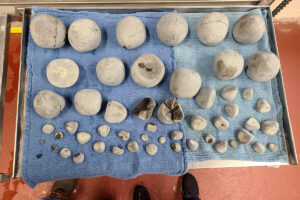Seven EEE Cases Confirmed in Florida Horses in July

The Equine Disease Communication Center (EDCC) reported July 26 that the Florida Department of Agriculture and Consumer Services has confirmed seven cases of Eastern equine encephalitis (EEE) in horses in that state this month.
The EDCC said:
- A 6-month old unvaccinated Tennessee Walking Horse colt in Okeechobee County became clinical on June 11th and was euthanized on June 12. He tested positive for EEE on July 2;
- A 4-year old unvaccinated Miniature Horse mare in Osceola County became clinical on July 2 and was euthanized the same day due to a poor prognosis. She tested positive on July 3;
- A 9-year old Friesian mare in Jackson County became clinical on July 2, tested positive July 10, and has fully recovered;
- A 2-year old unvaccinated Quarter Horse colt in Union County became clinical on July 3 and was euthanized July 5 due to a poor prognosis. He tested positive on July 17;
- An unvaccinated yearling Paso Fino filly in Polk County became clinical on July 9 and was euthanized July 11. Her positive test result came back on July 17;
- A 3-year old Quarter Horse mare in Suwannee County became clinical and was euthanized on July 14. The positive result was returned on July 18; and
- A yearling Warmblood filly in Clay County became clinical and was euthanized on July 10. She tested positive on July 20.
A viral disease, EEE affects the central nervous system and is transmitted to horses by infected mosquitoes. Clinical signs of EEE include moderate to high fever, depression, lack of appetite, cranial nerve deficits (facial paralysis, tongue weakness, difficulty swallowing), behavioral changes (aggression, self-mutilation, or drowsiness), gait abnormalities, or severe central nervous system signs, such as head-pressing, circling, blindness, and seizures. The course of EEE can be swift, with death occurring two to three days after onset of clinical signs despite intensive care; fatality rates reach 75-80% among horses. Horses that survive might have long-lasting impairments and neurologic problems
Create a free account with TheHorse.com to view this content.
TheHorse.com is home to thousands of free articles about horse health care. In order to access some of our exclusive free content, you must be signed into TheHorse.com.
Start your free account today!
Already have an account?
and continue reading.

Related Articles
Stay on top of the most recent Horse Health news with
















